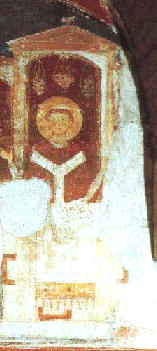 The Romans did not have a chance to take the late Pope Stephen's advice about
waiting for Hildebrand before holding an election. When news of Stephen's death
arrived, Gregory, count of Tusculum, and other lords swarmed into the city with
their men-at-arms and took over the election. In vain the cardinals protested;
in vain St. Peter Damian lifted his voice. In spite of the cardinals, a
tumultuous mob proclaimed John, bishop of Velletri, pope. He was enthroned as
Benedict X. But the election was not uncontested.
The Romans did not have a chance to take the late Pope Stephen's advice about
waiting for Hildebrand before holding an election. When news of Stephen's death
arrived, Gregory, count of Tusculum, and other lords swarmed into the city with
their men-at-arms and took over the election. In vain the cardinals protested;
in vain St. Peter Damian lifted his voice. In spite of the cardinals, a
tumultuous mob proclaimed John, bishop of Velletri, pope. He was enthroned as
Benedict X. But the election was not uncontested.
Even at Rome in the Trastevere district, a group refused to acknowledge
Benedict. St. Peter Damian and the cardinals fled North. And on his way back
from France, the man was coming for whose arrival Pope Stephen had wished the
Romans to wait, Cardinal Hildebrand. When Hildebrand learned that the house of
Theophylactus was once more trying to get control of the papacy, he acted
swiftly. First he secured the support of Duke Godfrey and of the German court.
Then he held a meeting with the cardinals at Siena at which Gerard of Burgundy,
bishop of Florence, was named pope-elect. Duke Godfrey and Wibert, the imperial
chancellor, mobilized at Sutri. Then after Gerard held a council which declared
Benedict deposed, the army marched on Rome.
A little fighting sent Benedict and his barons flying. Then a great assembly
gathered at the Lateran to investigate the election of Benedict. The council
declared the election invalid and deposed Benedict. Gerard was elected and
enthroned as Nicholas II. Gerard was born in Burgundy, and like his predecessor
he had been a canon at Liege. While bishop of Florence he had made a reputation
as a reform prelate. As pope he lived up to this reputation. The main blow
struck for reform by Nicholas was the promulgation of new papal election decrees
at a synod held at Rome in 1059. According to these decrees the pope should be
elected by the cardinal-bishops. The rest of the clergy and the laity of Rome
had the right to acclaim the election. The pope should normally be a member of
the Roman clergy, but in case of necessity could come from outside Rome. The
election, if possible, was to be held at Rome; but if necessary, it could be
held elsewhere.
The pope- elect was to wield full authority even if he could not reach Rome.
Imperial control was limited to a personal right granted by the pope to confirm
papal elections. These decrees, an important move toward papal independence,
were bitterly resented by the German court, and a papal legate, sent to smooth
matters over, was turned away. A German synod dared to condemn the decrees and
declare Nicholas II deposed. But Nicholas could ignore the angry clamor, for he
had two strong supports in Duke Godfrey and the Normans. Nicholas had secured
the aid of the Normans at Melfi in 1059. At a meeting there, the Pope agreed to
recognize Robert Guiscard as duke of Apulia, and the Normans agreed to supply
the strong arms Nicholas needed to seize Benedict and maintain his independence.
In his short pontificate Nicholas did much. He renewed the election decrees in
1061. He condemned Berengarius, a Frenchman who denied transubstantiation. He
fostered reform by means of energetic legates; and he made Hildebrand, reform's
greatest champion, archdeacon of the Roman church.
Nicholas II died at Florence in July 1061.
Excerpted from "Popes
Through the Ages" by Joseph Brusher, S.J.

